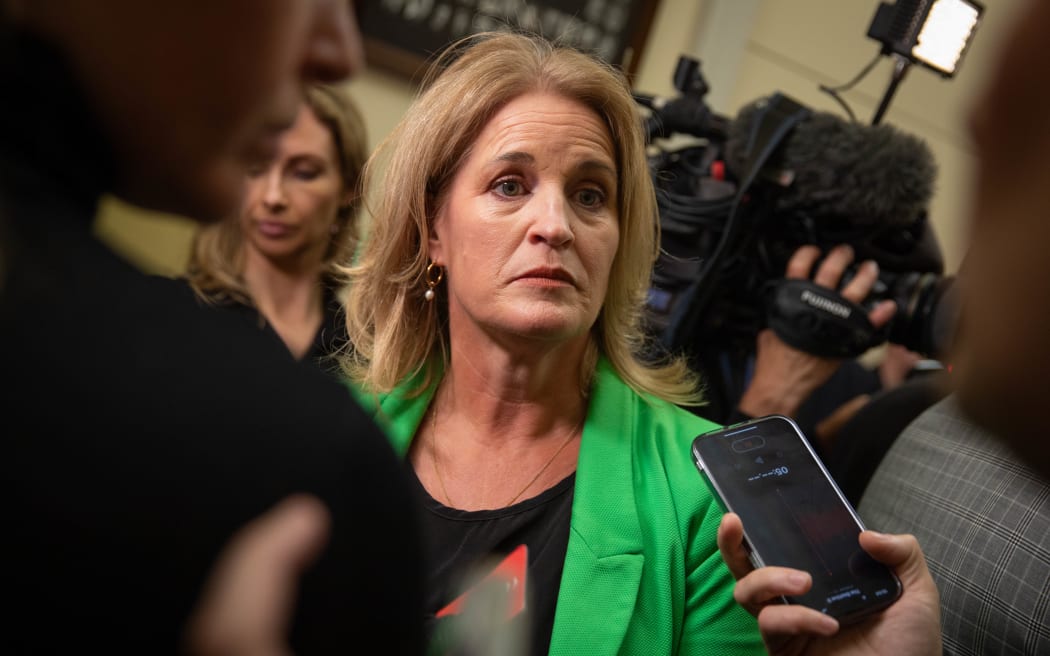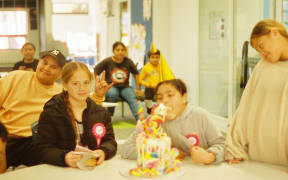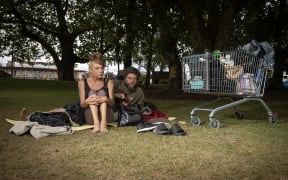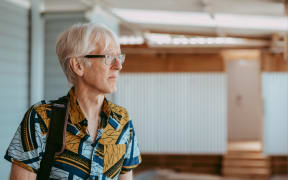
Social Development Minister Louise Upston Photo: RNZ / Angus Dreaver
The government has announced its new top-priority approach for families with children in emergency housing, while signalling a stricter approach for those accessing it.
Housing Minister Chris Bishop, Social Development Louise Upston and Associate Housing Minister Tama Potaka announced the moves in a statement on Wednesday.
The Priority One category will mean families with dependent children in emergency housing for longer than 12 weeks would automatically move to the top of the waitlist, from April. Bishop said the policy was expected to prioritise about 800 of the roughly 3000 families on the waitlist.
It was set out as a policy in National's election campaign, and ticks off another of the items on the coalition's 100-day plan.
However, Upston signalled it would come alongside a stricter approach to allowing people into emergency housing in the first place.
"At the same time as introducing Priority One we'll also be strengthening the verification processes for those entering emergency housing, reviewing eligibility settings, and introducing new obligations," she said.
She said verification, eligibility, and limits to the ability for officials to use discretion for applicants for emergency housing would be done before August.
"MSD staff assessing anyone applying for emergency housing will increase their scrutiny of whether they have unreasonably contributed to their immediate emergency housing need, whether they have taken reasonable efforts to access other housing options and whether they have previously paid their emergency housing contribution.
"This will include escalating for further consideration by a manager on a case-by-case basis, and making a grant for one to four days - as opposed to the current options of seven to 21 days - to enable further scrutiny before a grant is approved for a longer period."
Speaking to reporters at Parliament, she said obligations for emergency housing tenants were already in place, and the changes would encourage officials to ensure all other avenues had been explored first.
"If we can move someone straight into private accommodation, a private rental, straightaway, then that's a way better outcome," she said. "I'm encouraging them to take greater consideration of the applications rather than just giving a grant straightaway and we see a family and children go into a motel - we want to slow that down."
Asked if it would mean more people living on the streets, she said "the really important thing here is what's the end goal, so the end goal is we don't want children in motels".
However, she said she would not be comfortable if more children ended up homeless under her watch.
"I'm not saying it is going to be perfect, what I am saying is that we will have fewer children in motels and that is what we are out to achieve."
She said after those steps were taken, the government would be making further, more permanent changes around regulations, criteria, suitability, and steps people needed to take.
Ending emergency housing 'blight'
Bishop said these were the "first steps to end the blight that is emergency housing".
It cost the government about $340 million a year, which he said was "paying for families to live largely in misery and squalor".
He said other "bold and radical steps" were needed to solve the problem.
"We're looking at the whole system, so we're looking at innovative solutions like social bonds for example, working with private landlords, how we need to fix the system to end emergency housing or at least to reduce it to the level where a few people spend a small amount of time in motels."
He said it was now an "institutionalised bureaucracy where now around 3000 families live in those motels. We're determined to fix that problem - the social cost and the economic cost to the country is enormous".
Asked where they would go if not into motels, he said there were some vacancies in social houses. Despite the government's announcement being titled "first steps taken to end emergency housing," Bishop said it would always exist as a safety net.
"The government is always going to provide a final blanket safety net for families who are really doing it rough - and no one wants families living in tents and things like that or sleeping rough on the streets."
He and Upston said not all people who were in emergency housing were on the social housing register, and argued against conflating the problem of emergency housing with the need for a social home.
"The system is a mess," Bishop said. "There are hundreds of families who are in emergency housing right now who are not on the register and a lot of those families exit from emergency housing not into social housing but into private rentals.
He said housing supply was ultimately what mattered, and the government would also build "thousands upon thousands" of homes around the country.
"The last National government I was a member of and I think it is true - and I've said this before - didn't do enough around housing. However, the last six years is on Labour."
Potaka said the government was committed to ending large-scale use of emergency housing motels, and returning them to a rarely and briefly needed last resort.
"Solving emergency housing won't be easy and it won't happen immediately. Bold and radical steps will be required. We'll be exploring a range of options including better support to prevent the need for emergency housing in the first place, as well as for those who exit.
"We will be applying a social investment lens to this problem, targeting support where people need it and looking at innovative options like social bonds."
'You've got to build the houses to put them in' - opposition
The opposition argued there should be a stronger focus on building social houses.
Labour's Housing spokesperson Megan Woods said the priority category appeared similar to the pilot work the previous government had done in Rotorua.
"Having children living in motels was never acceptable to us and it was something we worked on each and every day," she said.
"Our government built the most state houses that any government had since the 1950s ... if you're going to keep moving people on then you've got to build the houses to put them in.
"Yes it is a crisis of emergency housing, but more importantly this is what a housing crisis looks like."
She said the government needed to commit to building more social houses after 2025.
"You can create all the new categories you want, but unless there are houses to move people into and out of motels, then you're not going to solve the housing crisis.
"Our questions of this new government make it clear that they will not commit to funding new places post 2025."
Green Party social development spokesperson Ricardo Menendez March said adding more barriers for people to enter secure, permanent public housing would leave more families out in the cold and make the problem worse.
"Restricting people's eligibility to access emergency housing at the same time as rolling back on house building is a disaster in the making," he said in a statement.
"The logic of making it harder for families to access emergency housing and easier to kick people out of public housing without building more homes is incomprehensible ... we absolutely need to reduce the number of people who have to rely on emergency housing for a place to call home."
"The government is wrong to assume people make themselves homeless. The system was designed to push people into homelessness due to high rents, lack of access to public housing and benefit levels below the poverty line."
Te Pāti Māori co-leader Rawiri Waititi said he had "grave concerns", given the homelessness statistics.
"The numbers for poverty in Aotearoa haven't changed: 100,000 people homeless, 60,000 of those are Māori. so I have grave concerns, yes, and absolutely it will impoverish people more and more as they head into these types of policies."
"Yes we should be prioritising whānau with tamariki, absolutely, but not at the expense of others who are vulnerable in those particular spaces."







